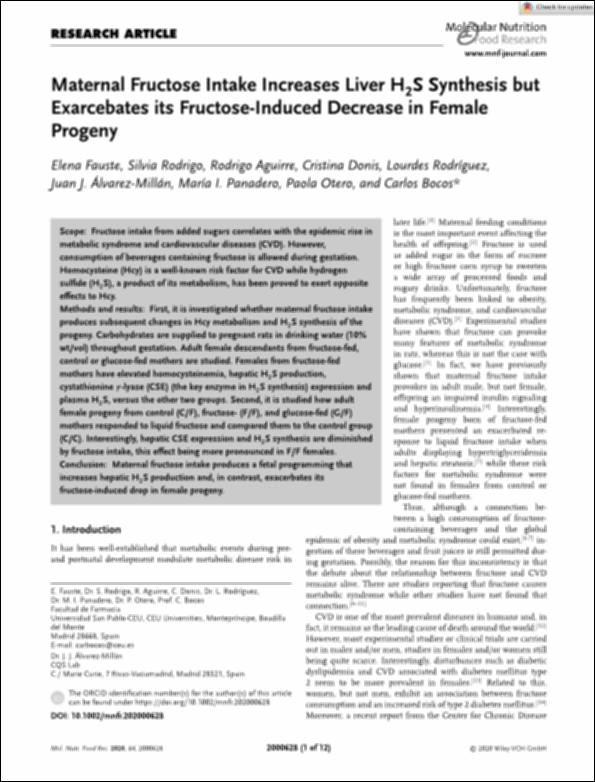Please use this identifier to cite or link to this item:
http://hdl.handle.net/10637/12943Maternal fructose intake increases liver H2S synthesis but exarcebates its fructose-induced decrease in female progeny.
| Title: | Maternal fructose intake increases liver H2S synthesis but exarcebates its fructose-induced decrease in female progeny. |
| Authors : | Rodríguez, Lourdes Bocos de Prada, Carlos Rodrigo, Silvia Fauste Alonso, Elena Panadero Antón, María Isabel |
| Keywords: | Fructose.; Fetal programming.; H2S.; Liver.; Oxidative stress. |
| Publisher: | Wiley |
| Abstract: | Scope : Fructose intake from added sugars correlates with the epidemic rise in metabolic syndrome and cardiovascular diseases. However, consumption of beverages containing fructose is allowed during gestation. Homocysteine (Hcy) is a well-known risk factor for cardiovascular diseases while hydrogen sulfide (H2S), a product of its metabolism, has been proved to exert opposite effects to Hcy. Methods and results : First, we investigated whether maternal fructose intake produces subsequent changes in Hcy metabolism and H2S synthesis of the progeny. Carbohydrates were supplied to pregnant rats in drinking water (10% wt/vol) throughout gestation. Adult female descendants from fructosefed, control or glucose-fed mothers were studied. Females from fructose-fed mothers had elevated homocysteinemia, hepatic H2S production, cystathionine -lyase (CSE) (the key enzyme in H2S synthesis) expression and plasma H2S, versus the other two groups. Second, we studied how adult female progeny from control (C/F), fructose- (F/F) and glucose-fed (G/F) mothers responded to liquid fructose and compared them to the control group (C/C). Interestingly, both hepatic CSE expression and H2S synthesis were diminished by fructose intake, this effect being more pronounced in F/F females. Conclusions : Maternal fructose intake produces a fetal programming that increases hepatic H2S production and, in contrast, exacerbates its fructose-induced drop in female progeny. |
| Description: | En: Molecular Nutrition Food Research. 2020. vol. 64 : 2000628. e-ISSN 1613-4133 |
| URI: | http://hdl.handle.net/10637/12943 |
| Rights : | http://creativecommons.org/licenses/by-nc-nd/4.0/deed.es |
| Issue Date: | 10-Aug-2020 |
| Center : | Universidad San Pablo-CEU |
| Appears in Collections: | Facultad de Farmacia |
Items in DSpace are protected by copyright, with all rights reserved, unless otherwise indicated.


